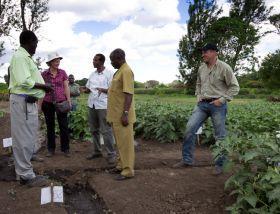
A leading crop expert has hailed vegetable production as the key to feeding the world and tackling global poverty, reports Australia’s ABC Rural news.
Dr Dyno Keatinge told scientists at the International Symposia for Tropical and Temperate Horticulture in Cairns, Queensland, last week that growing vegetables, not cereals, is the best way to tackle the challenge of global poverty and hidden hunger, the website said.
Keatinge, who is the outgoing director-general of the World Vegetable Centre in Taiwan, therefore called for more international funding in horticultural research to breed suitable vegetable varieties for conditions in developing nations.
'If you have just a small landholding — as most people do in the developing world — then you can make good money out of horticulture. But if you grow rice, or you grow wheat, you're likely to remain poor forever,' Keatinge said. 'I believe if people can be taught to farm effectively, can have a proper distribution of crops within their farming enterprises, they can end up to be more sustainable, more resilient, more profitable.'
ABC Rural said Dr Keatinge's remarks reflected a growing frustration in the horticultural science community at the focus of major donor agencies in developed countries on the bio-fortification of rice, wheat and maize. A better balance was required if more appropriate and diverse diets were to be promoted, Keatinge said.
'At the moment the lion share of all funding goes to staple cereals, it has done for the past 50 years,' he said. 'But I believe the time has come for that to change and that more effort should be given to these more nutritious, indigenous vegetables, for example, which are already nutrient dense and not a huge amount of work is required.'
According to the report, Dr Keatinge said the impact of international vegetable research and development had already shown the benefits of breeding improved lines of niche vegetables with an emphasis on open and self-pollinated crops, such as tomatoes, peppers and pumpkins, as well as some indigenous species with high nutrient density, such as nightshade or African eggplant.
He said the genebank in the World Vegetable Centre in Taiwan was able to offer a great diversity of germplasm to plant breeders working on solutions to threats to tropical vegetable production.
'We don't know yet enough about how to grow vegetables properly,' he said. 'Insects and diseases are the major problems for farmers today, they were yesterday and probably will be tomorrow. But we have to have research to be able to keep pace with being able to cope with these things.'



